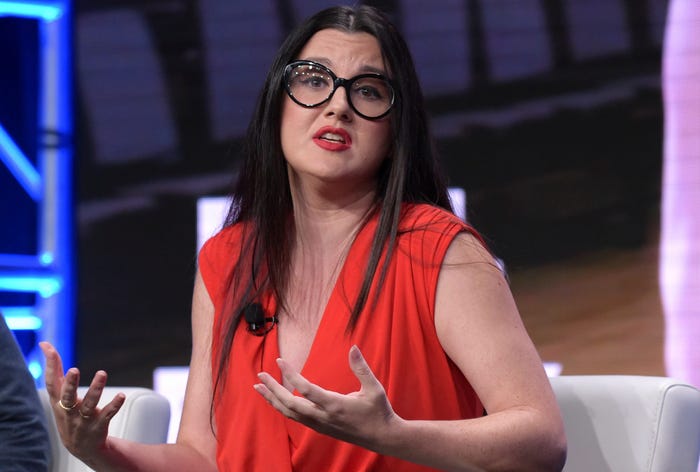Top Stories
OpenAI’s Fidji Simo Warns: Compute Deals Are Essential NOW

UPDATE: OpenAI’s CEO of Applications, Fidji Simo, has issued an urgent call for the company to aggressively pursue massive compute deals, emphasizing that the greater risk lies in failing to invest in computing resources. In a revealing interview with Wired, published Monday, Simo stated that OpenAI must continue to hyperscale its computing capabilities to meet growing demands.
Simo’s comments come at a critical juncture as the AI industry faces increasing pressure to innovate while managing costs. She highlighted that the ongoing scarcity of computing resources is forcing OpenAI to limit features like ChatGPT Pulse, which personalizes user experiences. “What’s much riskier would be to not lean into compute,” she said, underscoring the urgency of the situation.
The stakes are high, as OpenAI has committed to a staggering $1.4 trillion in data center investments over the next eight years. Despite facing annual losses in the billions, Simo insists that the demand for compute is so significant that the company has no choice but to proceed. “When you look at how constrained we are internally and how much more we could do if we had more GPUs, it’s very clearly the right decision,” she stated.
In a broader context, major tech leaders are echoing Simo’s sentiments. Meta CEO Mark Zuckerberg, who previously collaborated with Simo at Facebook, warned that playing it safe poses a greater risk to the industry than overspending. “The risk is higher on the other side,” Zuckerberg remarked in September, cautioning against a conservative approach in a rapidly evolving landscape.
The economic implications of these massive capital expenditures are being closely monitored, with some economists arguing that they could actually bolster the overall economy. However, Wall Street remains wary, drawing parallels to the Dot-Com bubble.
Amidst these developments, OpenAI’s CEO Sam Altman has clarified that the company is not seeking a government bailout should its data center investments falter. “If we screw up and can’t fix it, we should fail,” Altman declared on X, reinforcing the message that accountability is paramount in a capitalist framework.
Simo, who transitioned from Instacart to OpenAI in May, is also focused on enhancing features like ChatGPT Pulse. Currently, the lack of sufficient compute resources limits the rollout of this feature to select users, but Simo envisions a future where it is accessible to all. “I’m giving you one example, but there’s ten of those,” she noted, illustrating the potential for expanded services if computing capacity can be increased.
As the situation develops, industry watchers will be keenly interested in how OpenAI navigates these challenges and whether its aggressive investment strategy pays off. The urgency of securing adequate compute resources for innovation cannot be overstated, as the future of AI technology hangs in the balance.
Stay tuned for further updates on this evolving story as OpenAI continues to position itself at the forefront of the AI revolution.
-

 Science1 month ago
Science1 month agoIROS 2025 to Showcase Cutting-Edge Robotics Innovations in China
-

 Science2 weeks ago
Science2 weeks agoUniversity of Hawaiʻi at Mānoa Joins $25.6M AI Initiative for Disaster Monitoring
-

 Lifestyle1 month ago
Lifestyle1 month agoStone Island’s Logo Worn by Extremists Sparks Brand Dilemma
-

 Health1 month ago
Health1 month agoStartup Liberate Bio Secures $31 Million for Next-Gen Therapies
-

 World1 month ago
World1 month agoBravo Company Veterans Honored with Bronze Medals After 56 Years
-

 Politics1 month ago
Politics1 month agoJudge Considers Dismissal of Chelsea Housing Case Citing AI Flaws
-

 Lifestyle1 month ago
Lifestyle1 month agoMary Morgan Jackson Crowned Little Miss National Peanut Festival 2025
-

 Health1 month ago
Health1 month agoTop Hyaluronic Acid Serums for Radiant Skin in 2025
-

 Science1 month ago
Science1 month agoArizona State University Transforms Programming Education Approach
-

 Business1 month ago
Business1 month agoTruist Financial Increases Stake in Global X Variable Rate ETF
-

 Sports1 month ago
Sports1 month agoYamamoto’s Mastery Leads Dodgers to 5-1 Victory in NLCS Game 2
-

 Top Stories1 month ago
Top Stories1 month agoIndonesia Suspends 27,000 Bank Accounts in Online Gambling Crackdown









